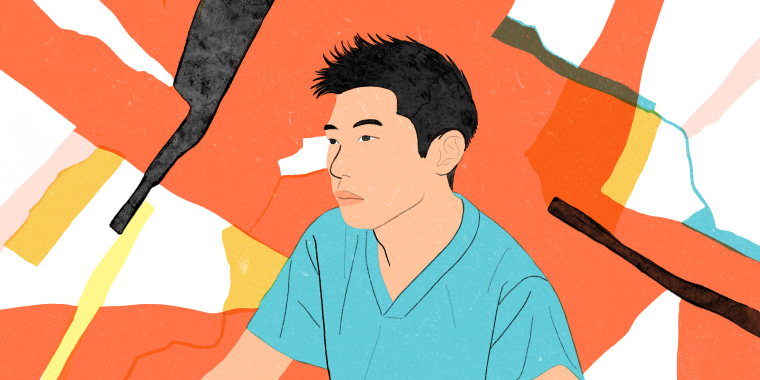Dr. Calvin Sun always knew he’d face a pandemic in his lifetime. But he never expected he’d be risking his life to fight it.
Sun, 33, a native New Yorker, is in his second year as an attending physician in emergency medicine, though for much of his adult life he was certain he would never become a doctor. When he did, he chose to work on a per diem basis, filling in shifts for doctors out sick in emergency rooms across New York City — a choice he said he made in part as assurance that he could sit out a state of emergency like this one.
But to his own surprise, Sun chose to begin most days in the past months on the front lines of the COVID-19 pandemic, assisting critically ill patients in a city that has been devastated by the coronavirus.
“Even if I came back crying, or burned out, or feeling inadequately protected, or feeling abandoned,” he said. “I still went in the next day.”
Sun said that sometimes shifts can crop up with just hours notice. But to him, this has never been a challenge.
“The person who survives the apocalypse is not the strongest or the smartest, but the most flexible,” he said. “My mantra is I can handle anything, anytime, anywhere.”
Though his work takes him to hospitals across the city, Sun said he predominantly serves ERs in Queens, the Bronx and Brooklyn.
And inside these ERs, the situation can be dire. “Upstairs we hear cardiac arrest, after cardiac arrest, after cardiac arrest,” he said earlier this month. Hospitals are so overwhelmed with patients, he added, that newcomers “have to wait for someone to die before they can get a bed.”
“But they’re waiting so long they’re dying in the emergency room.”
On a typical shift, deaths are occurring even as he starts work. He knows he is putting himself at risk of contracting the virus. Like many of his colleagues, Sun worries about transmitting it to a family member or a loved one — a concern especially prevalent with his mother, who has Parkinson's disease. But these fears have not stopped him from working each day.
“This is what I train for,” he said. “I aspire to rise to the occasion. As afraid as I am going to work, I realize that courage can't exist in the absence of fear.”
“I don’t let fear prevent me from going to work,” he added.
At the end of April, Sun said the situation in New York was beginning to calm, and he had started taking on fewer shifts as ERs were seeing lower volumes of patients.
Sun said he never expected to become a doctor — or rather, he stopped expecting to shortly after his father passed away from a sudden heart attack. Sun was 18 at the time, and said he realized that becoming a doctor was his parents’ dream for him, not his own. He decided he wanted to “live for myself,” and to “fight the Asian American stereotype,” and after graduating from Columbia University, he spent the next two years bartending.
He thought his future was in MTV entertainment, but he ended up going to med school and eight years later, he completed his residency.
Sun said he spent a long time grappling with his identity as an Asian American. Bullied as one of the few Asian kids in his classrooms, he said he internalized a lot of the small acts of racism he faced.
He credits his brother for helping him unpack and understand his identity. After his father’s death, Sun said he spent time working through what it meant to be Chinese American, and became more engaged in the Asian American community.
At Columbia, he served as the president of the Asian American Alliance, and went on to serve as the director for the East Coast Asian American student union. Today, Sun describes himself as a staunch advocate of Asian American civil rights, over the years involving himself in issues centering on a range of issues, such as voter registration and immigrant rights.
In his work as a doctor, Sun said he has experienced racism in small ways, like patients flinching when he takes off his mask and they realize he is Asian, or expressing concern that they may have contracted the virus because they came in contact with him, someone of Asian descent. He added that he tries to defuse racism and ignorance with humor when possible, like asking them jokingly if they were “making out with this Asian person” to point to the absurdity of their concern, but he stressed that he never ignores it.
“I will definitely always address it,” he said. “I would never ignore actual racism in New York.”
This story is part of our Asian Pacific American Heritage Month series, "AAPI Frontline," honoring essential workers who are serving their communities during the coronavirus pandemic. Read more here.
Follow NBC Asian America on Facebook, Twitter and Instagram.
